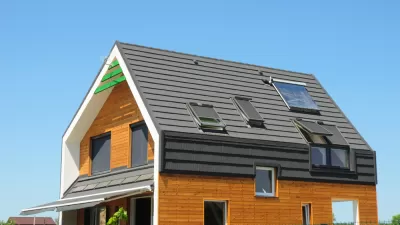Two icehouses have arrived in Harrisburg on a mission from the Central Pennsylvania chapter of the U.S. Green Building Council.

Laura Legere reports on a creative demonstration of the power of innovative building practices taking place on the steps of the Pennsylvania State Capitol.
There, green building advocates have placed two eight-foot-by-eight-foot sheds filled with blocks of ice. Legere explains in more detail:
The icehouse on the left meets Pennsylvania’s energy code requirements, which have not been updated since 2009. The one on the right is super-insulated and tightly sealed to meet passive house standards, an energy efficiency benchmark that surpasses even the most modern building codes.
It should only take three weeks to reveal the differences between the two sheds, and the idea behind the demonstration is to "inspire lawmakers to update the state’s energy conservation building codes and reform the process for adopting new code."
The state has a mandate to update its model international standards every three years, according to Legere.
The Senate and House have each passed bills this spring designed to revise the state’s building code adoption process, which has largely stalled since a 2011 law required an advisory board to approve each code change with a two-thirds vote and made it cumbersome to catch up with past standards.
The Central Pennsylvania chapter of the U.S. Green Building Council has organized and promoted the event along with partners. The chapter has provided more information on the demonstration with a press release on June 6, 2017, otherwise known as "Icehouse Demonstration Day."
FULL STORY: Melting ice on Pa. Capitol steps builds case for green building codes

Alabama: Trump Terminates Settlements for Black Communities Harmed By Raw Sewage
Trump deemed the landmark civil rights agreement “illegal DEI and environmental justice policy.”

Study: Maui’s Plan to Convert Vacation Rentals to Long-Term Housing Could Cause Nearly $1 Billion Economic Loss
The plan would reduce visitor accommodation by 25% resulting in 1,900 jobs lost.

Planetizen Federal Action Tracker
A weekly monitor of how Trump’s orders and actions are impacting planners and planning in America.

Wind Energy on the Rise Despite Federal Policy Reversal
The Trump administration is revoking federal support for renewable energy, but demand for new projects continues unabated.

Passengers Flock to Caltrain After Electrification
The new electric trains are running faster and more reliably, leading to strong ridership growth on the Bay Area rail system.

Texas Churches Rally Behind ‘Yes in God’s Back Yard’ Legislation
Religious leaders want the state to reduce zoning regulations to streamline leasing church-owned land to housing developers.
Urban Design for Planners 1: Software Tools
This six-course series explores essential urban design concepts using open source software and equips planners with the tools they need to participate fully in the urban design process.
Planning for Universal Design
Learn the tools for implementing Universal Design in planning regulations.
Caltrans
Smith Gee Studio
Institute for Housing and Urban Development Studies (IHS)
City of Grandview
Harvard GSD Executive Education
Toledo-Lucas County Plan Commissions
Salt Lake City
NYU Wagner Graduate School of Public Service





























